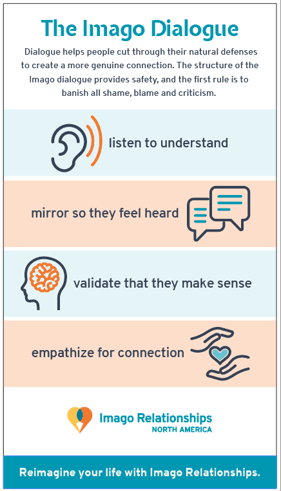
Here we are in spring and sheltering in place with our partners and families 24/7, something we seldom ever do.
For some, it will seem like a blessing, a time to celebrate their relationship and become even closer emotionally.
For others, it can seem like a curse with increasing conflicts, pressure, and frustrations.
I'm hearing about such from clients and peers. I am hearing from my clients, peers, and colleagues about their struggles. It is reported that China is seeing a rise in divorce filings as couples emerge from their long quarantine.
In reality, conflict doesn't always have to mean things are bad. Handled properly, it can lead to better understanding and deeper emotional ties.
So, let's talk a bit about how to deal with conflicts successfully.
The key to a successful, long-term relationship is empathy, validation, and good will. If your partner says and believes that the moon is made of cream cheese, and you know that it obviously isn't, instead of criticizing them, try validating the world from "their" point of view.
Try to see thoughts through their eyes and hear it from their point of view, not yours. Don't criticize, interrupt, judge, or interpret. Be quiet and listen.
When you expect something from your partner, discuss it with them. Don't think they're a mind reader. This often happens, even with couples who've been together a long time and think, "They know me so well. I shouldn't have to tell him what I need or want." Assume that your partner doesn't know what you want, even if you have shared it with them repeatedly.
Here are tips when you're trying to smooth over a conflict:
Tip #1 - Avoid overstatement.
I advise couples never to begin a sentence with:
- "You always say that…"
- Or, "You never do this…."
That's making a blanket statement that excludes even the one exception to the rule you're trying to lay down.
When you're angry, it feels good to utter such sweeping judgments, but they do nothing for your relationship. Instead, qualify and leave your partner an escape hatch, such as:
- "For the most part…"
- "Mostly…"
- Or, "More than I like…."
Then you're giving credit where it's due, acknowledging the (admittedly few) times your partner might have said or done whatever you're accusing them of doing.
Tip #2 - Never say, "I shouldn't have to ask."
Yes, you should. In any relationship, you must ask for what you want. In therapy, this is sometimes called symbiosis, that is thinking that your partner thinks and feels just like you do and should "just know."
They may have been that intuitive during the romance stage, but that's because of all the love hormones and because you were closely tracking each other. The purpose was to bond you together, not set the entire tone for your relationship. If you expect it to, you'll be disappointed.
Tip #3 - Intentional Dialogue.
Harville Hendrix's Imago Relationship Therapy (IRT) model creates a safe container for effective communication called Intentional Dialogue, which breaks down the idea that your partner should see the world the way you want him to and vice versa.
I use it with every set of partners. It emphasizes mirroring, validation, and empathy. Most couples engage in monologues, not dialogues, so this offers a realistic, valid way to communicate.

Tip #4 - Mirroring.
This is the first part of the Intentional Dialogue communication skill. One partner sends information, and the other receives it. The Sender delivers all the information relating to one topic until they're entirely finished, using short declarative sentences that start with the word "I."
The Receiver doesn't interpret, diminish, or magnify what was said but simply repeats it like a parrot, and then asks:
- "Did I get it?"
- And "Is there more?"
- Until the Sender says, "No, that's all."
For example, your partner might say:
- "I'm upset you didn't clean up after the dog after we agreed you would."
- You'd then say, "I heard you say you're upset that I didn't clean up after the dog when we agreed I would."
- Then you add, "Did I get it?"
- And "Is there more?"
Intentional Dialogue counteracts common intimacy-blocking behaviors such as dominating the conversation, interrupting and finishing each other's sentences, being overly critical or too close-mouthed, failing to pay close attention, and being judgmental by interpreting what you think they're really saying, or walking away. The couple's dialogue prevents all that and creates intentionality in their communicating with each other.
Tip #5 - Validation.
This is the second part of Intentional Dialogue. After your partner finishes what they're saying, you validate what you heard them say—not from your point of view but theirs. The Receiver says:
- "What you're saying makes sense to me. From your point of view, I can see why you'd think this way."
You are not agreeing, simply validating his point of view. For that moment, you're looking through their eyes, not yours, and validating the way they view the world and acknowledging that yours is not the only way to view the conflicts in your relationship.
For most people, this can be very hard. Telling someone "What you say makes sense," can suggest that you agree with them and that you are wrong. That isn't what this is at all.
We live in a world where what makes someone right makes another wrong. Wars break out because of this mentality. IRT suggests simply suspending your point of view temporarily and letting your partner's reality surface as well. It's good practice to keep your reality while validating the reality of another person too.
Tip #6 - Empathy.
This is the final part of the Intentional Dialogue—trying to imagine what your partner might be feeling, given what he is saying. Here again, you put aside whatever your feeling is, contain it, and try to imagine his point of view. What are they feeling?
After the Sender is finished and the Receiver has mirrored back, validated, and empathized, the partners then switch roles, but sticks to the same topic so as not to stack up issues. This allows both partners' realities to coexist.
Afterward, if this doesn't settle their conflict, Imago Therapy implements other communication techniques. I suggest picking up Hendrix's books to learn more.
When tensions or unspoken frustrations build-up, we can become overly reactive, which ups the conflict even further.
These are a few of the tools that have proven to be helpful to couples who are trying to respond in more effective ways to manage conflict in their relationship. Without response-ability, your brain will react instinctively, creating distance, rupture, and disconnection from your partner.
With too strong an emotional charge, we "know better than" our partner and ultimately become righteous, responding emotionally and inappropriately. I hope, as I'm sure you do that this time of self-isolation and sheltering in place will help teach us all to not only deal more effectively with conflicts but help us learn to treat each other with greater kindness and compassion.
If you are struggling with conflict in your relationship, we're here to help. Check out our Imago Relationship Workshops and Relationship Therapy. We also have Online Couples Therapy and Online Couples Workshops right now!
Discover more about Imago with our Imago Professional Membership, Imago Professional Facilitators, Imago Professional Training and Imago Educational Webinars.
 This blog post was written by Joe Kort, Ph.D., LMSW, Imago Certified Relationship Therapist and AASECT Certified Sex Therapist & Supervisor of Sex Therapy.
This blog post was written by Joe Kort, Ph.D., LMSW, Imago Certified Relationship Therapist and AASECT Certified Sex Therapist & Supervisor of Sex Therapy.
Joe is a leading expert on sex and relationships. He specializes in Out-of-Control Sexual Behaviors (OCSB)/“sex addiction,” Relationship Problems and Marital Conflict, Sex Therapy, Sexual Identity Concerns, Depression, Anxiety and Post Traumatic Stress Disorder (PTSD). His practice is located in Royal Oak, Michigan, and he welcomes clients from all over the Metro Detroit area. Joe is also available for long-distance coaching and consultation. His practice is mixed with straight, gay, lesbian, bisexual, and transgender individuals and couples.
Joe graduated from Michigan State University with dual Psychology and Social Work majors. At Wayne State University, he earned his Master's in Social Work (MSW), then a Masters (MA) in Psychology, and has received his Doctorate (Ph.D.) in Clinical Sexology from the American Academy of Clinical Sexologists (AACS).
In addition, Joe is also the founder and director of The Center for Relationship and Sexual Health (his associate's biographies can be found here), teaching faculty at the University of Michigan Sexual Health Certificate Program, a Board Certified Sexologist, a member of the Academy of Certified Social Workers, a member of the National Association of Certified Social Workers, a member of EMDRIA Eye Movement Desensitization and Reprocessing (EMDR) Basic Training, and a licensed clinical social worker in the state of Michigan.
Joe has also written a book to help couples and individuals on Amazon.com called Erotic Orientation: Helping Couples and Individuals Understand Their Sexual Lives.

